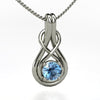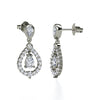Pewter Purse Flask

The assumption behind the demurely-coined purse flask is that a handbag-toting woman drinks just a small amount of alcohol. Not true. Most of the women we know would need at least two for a proper night on the town. Dowdy mid-century ideas of propriety aside, these discreet flasks are for when you want a few classy nips of a good spirit, to tip a little something into a sober glass of juice, or to calm the nerves at a wedding without marring your bridesmaid dress by holding a fifth in a paper bag.
The flasks are small enough to hide in the folds of your dress pocket, purse or jacket, so careful there — you could easily mistake it for your cellphone. The flasks come in two sizes: 2 ounces or 3.
A bit more delicate in capacity, these flasks are still made in the brawny steel-producing city of Sheffield, England, by Arthur Richard Wentworth, the pewtersmith responsible for the pocket flask and the round flask. Because pewter is part of Sheffield’s steel-making heritage, these flasks are stamped with seals of authenticity and association: the coat of arms of Sheffield, minimum tin content (92%), the Pewter Craftsmen trade guild stamp, a European Union authentication stamp, and Wentworth’s initials.
Fill the flask using a funnel or a steady hand. Only fill flasks with unmixed liquor. Hand wash with soap and hot water and dry with a soft cloth. No dishwashers allowed.
A metal alloy, pewter has been around since the Bronze Age and preceded glass, porcelain and plastic as the household material of choice. Unlike other metals that tarnish at the slightest contact with alcohol, pewter keeps to itself, never imparting nasty metallic flavors to your lips.
Wentworth flasks contain a minimum of 92% tin. Tin doesn’t oxidize in air easily (it is often used as an anti-corrosive coating for other metals), and is favored for food and drink because of it’s low toxicity. Because of tin’s malleability, the remaining 8% of pewter is a mix of hardening metals, mostly copper and antimony. (Lead was phased out of pewter many decades ago.)
Please email questions@kaufmann-mercantile.com. We reply to every email promptly.
To stay updated on product launches and articles on our blog, follow us via mail, RSS, Twitter orFacebook.

